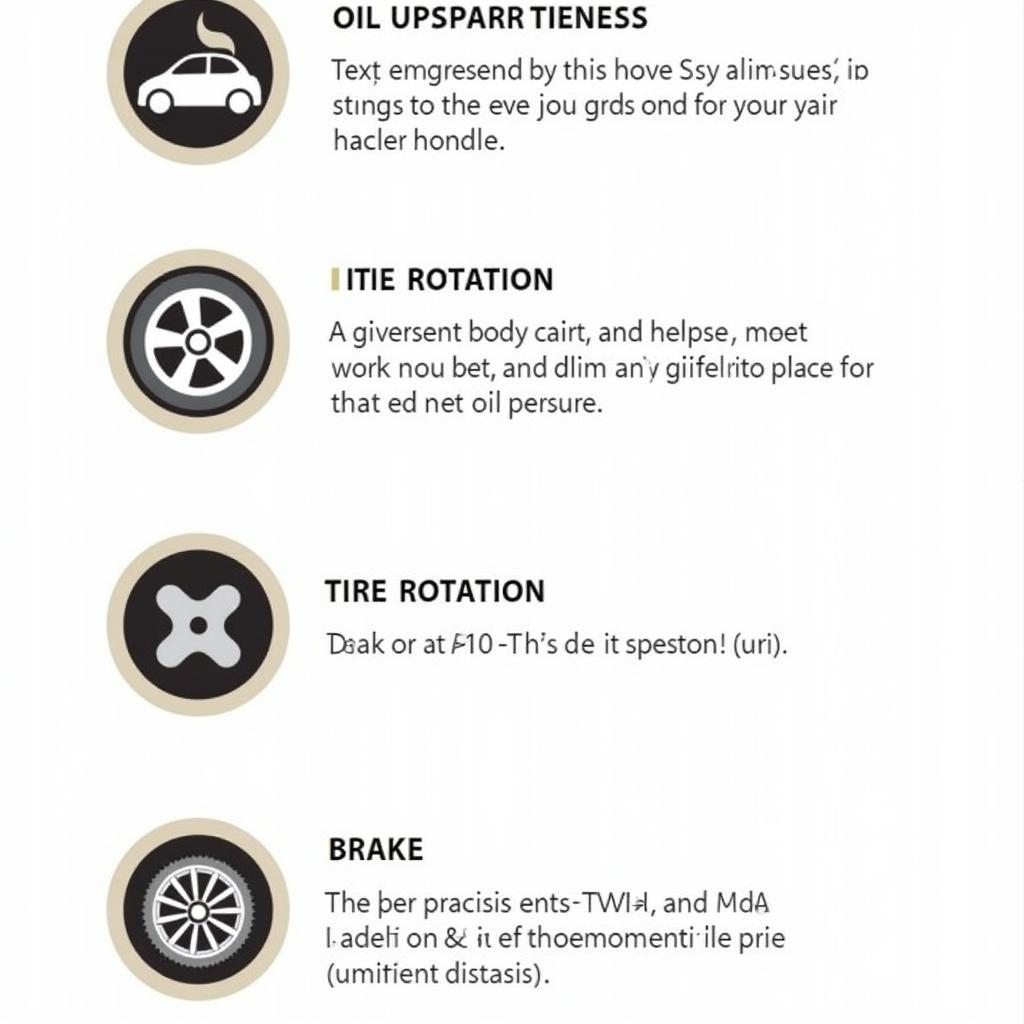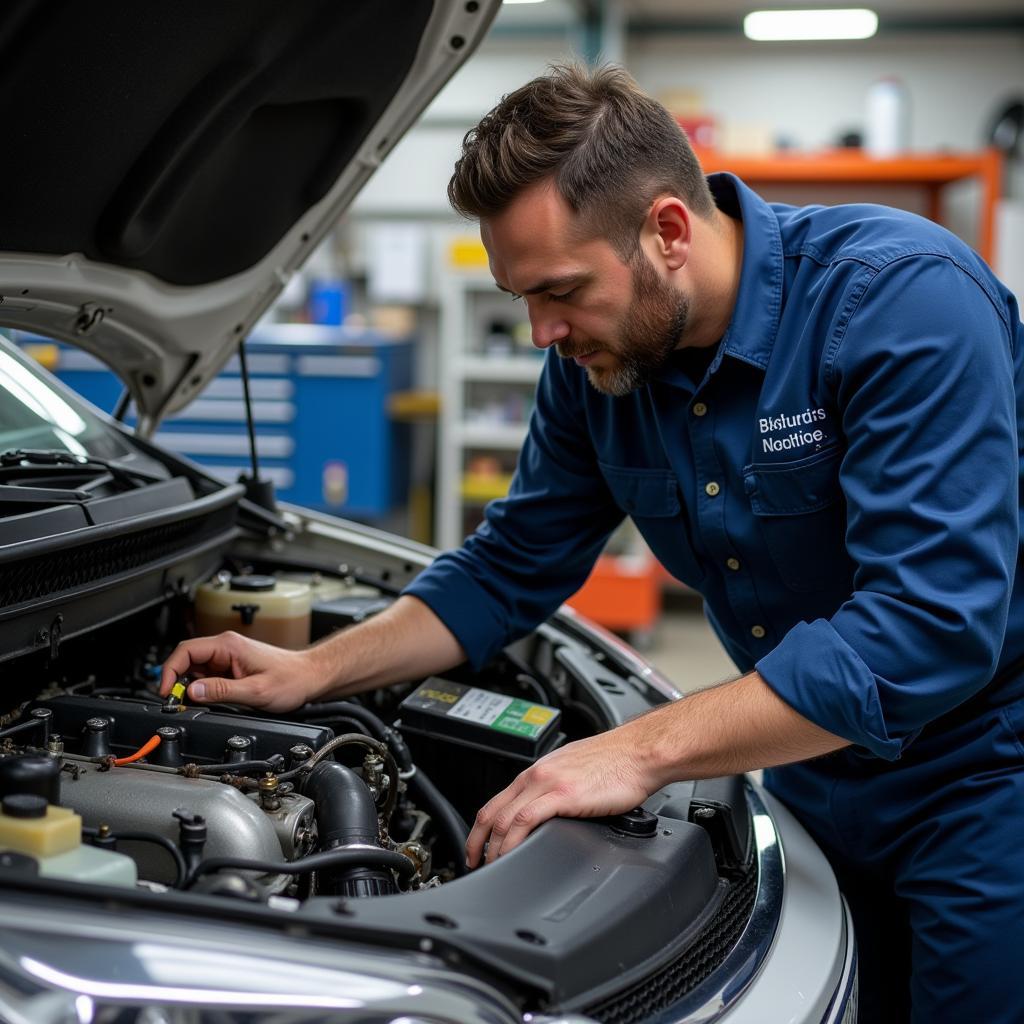What is Car Service?
Car service refers to a range of maintenance, repair, and care procedures performed on vehicles to ensure their optimal performance, reliability, and longevity. It encompasses a wide spectrum of services, from routine checks and fluid changes to complex engine overhauls and electronic system diagnostics.
The Importance of Regular Car Service
Regular car service is not merely an option but a crucial aspect of vehicle ownership. Just like our bodies thrive on routine health checkups, cars require consistent attention to prevent minor issues from escalating into major problems.
 Routine Car Maintenance Checklist
Routine Car Maintenance Checklist
By adhering to a scheduled maintenance plan, car owners can reap numerous benefits, including:
- Enhanced Safety: Regular inspections and timely repairs help ensure that all critical safety components, such as brakes, tires, and lights, are in optimal condition, reducing the risk of accidents.
- Improved Performance: Well-maintained vehicles tend to perform better, offering smoother rides, better fuel efficiency, and optimal engine power.
- Extended Lifespan: Consistent care and timely repairs can significantly extend the lifespan of a vehicle, maximizing the return on investment.
- Higher Resale Value: A well-documented service history can significantly increase a vehicle’s resale value, attracting potential buyers and fetching better prices.
“Think of regular car service as an investment, not an expense,” says John Peterson, a seasoned automotive expert with over 20 years of experience. “The small costs incurred during routine maintenance pale in comparison to the hefty expenses associated with major repairs resulting from neglect.”
Types of Car Service
Car service can be broadly categorized into two main types:
1. Routine Maintenance
This involves scheduled service visits based on mileage or time intervals specified in the vehicle manufacturer’s manual. Common routine maintenance tasks include:
- Oil and Filter Change: The lifeblood of an engine, oil needs regular replacement to lubricate moving parts, reduce friction, and prevent premature wear and tear.
- Tire Rotation and Pressure Check: Rotating tires ensures even wear and tear, while maintaining proper tire pressure improves fuel efficiency and handling.
- Brake Inspection and Pad Replacement: Brakes are critical for safety, and regular inspections help identify wear and tear, ensuring optimal stopping power.
- Fluid Top-ups: Vehicles rely on various fluids, including coolant, brake fluid, and transmission fluid, to function correctly. Regular top-ups prevent overheating, leaks, and system failures.
2. Repair Services
These are performed to address specific issues or malfunctions that arise during the vehicle’s lifespan. Some common repair services include:
- Engine Repair: From minor tune-ups to major overhauls, engine repairs address issues related to performance, efficiency, and overall functionality.
- Transmission Repair: Responsible for transferring power from the engine to the wheels, transmission repairs are crucial for smooth gear shifting and optimal performance.
- Electrical System Repair: Modern vehicles rely heavily on complex electrical systems, and any malfunctions in wiring, sensors, or electronic components require specialized repair services.
- Heating and Cooling System Repair: Ensuring comfortable cabin temperatures, these repairs address issues with the air conditioning, heating, and ventilation systems.
 Car Undergoing Engine Repair
Car Undergoing Engine Repair
Finding a Reliable Car Service Provider
Choosing a trustworthy and competent car service provider is essential for ensuring your vehicle receives the best possible care. Here are some key factors to consider:
- Reputation and Reviews: Check online reviews and ratings, and seek recommendations from friends, family, or local automotive communities.
- Certifications and Expertise: Look for certifications like ASE (Automotive Service Excellence) which indicate technicians possess the necessary skills and knowledge.
- Transparency and Communication: Choose a service provider who clearly explains the work required, provides detailed estimates, and communicates openly throughout the process.
- Warranty and Guarantees: Reputable service providers stand by their work, offering warranties on parts and labor to provide peace of mind.
Conclusion
Understanding “what is car service” is not just about knowing the technicalities but recognizing its significance in ensuring a vehicle’s safety, performance, and longevity. By embracing regular maintenance and addressing issues promptly with a reliable service provider, car owners can enjoy many miles of worry-free driving.
FAQs
1. How often should I service my car?
Refer to your vehicle’s owner’s manual for the recommended service intervals. However, a general guideline is an oil change every 3,000 miles or six months, and a comprehensive inspection every 12,000 miles or 12 months.
2. What is included in a basic car service?
A basic service typically includes an oil and filter change, tire rotation, fluid top-ups, and a visual inspection of key components.
3. How can I find a trustworthy mechanic near me?
Ask for recommendations from friends, family, or check online reviews for highly rated mechanics in your area.
4. Is it necessary to go to the dealership for service?
While dealerships have specialized knowledge of your car’s make and model, independent mechanics can often provide equally competent service at a lower cost.
5. What are some signs my car needs service?
Unusual noises, warning lights on the dashboard, fluid leaks, vibrations, or changes in handling can indicate potential problems requiring professional attention.
To learn more about specific car service needs, explore our articles:
- What maintenance services are included with Toyota Care?
- What education is needed for personal care services
Still have questions or need expert assistance with your car service needs?
Our team of car care specialists is available 24/7 to assist you. Contact us via WhatsApp: +1(641)206-8880, or Email: [email protected].

